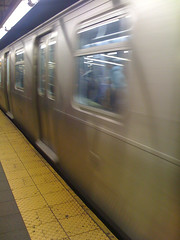The economy sucks. Whether you are in the US or the UK, you are trying to find ways to save a few dollars and lessen the sting of the recession. Here are my 10 tips to survive the recession - transport style.
- Invite your friends over to hang out. You don't drive, so you save on gas and the frustration of traffic. Better yet, suggest they carpool on their way over.
- Dump the gym membership and walk or bicycle to/from local stores. You'll still get plenty of exercise and you'll be doing your part to keep a car off of the road.
- Don't drive to the carwash. Instead, stay at home and do it yourself. You'll get your heart pumping and have a sense of accomplishment once you are done.
- Find out how to commute from your home to your office using public transit. Even if you have to drive a few miles to a park and ride, you'll have a less stressful commute and save money on gas and car maintenance.
- Buy monthly passes for transit. Paying the regular base fair will quickly add up. Instead, get a monthly pass, which is usually at a significant discount, and see the savings add up.
- Call your insurance company and let them know that you are using public transit or carpooling more, and see if you can get a discount on your auto insurance.
- Similarly, let your human resources department know that you are looking into transit alternatives. See if they offer free or discounted transit passes, parking passes or other benefits for using alternative means to get to work.
- If you must drive to run errands, see if neighbors would like to carpool and combine trips. You'll save gas and build a friendship or two.
- Find out about low-cost bus carriers between major cities. Instead of driving from DC to NYC, why not try BoltBus for $5 each way?
- Ask your employer about working from home 2-3 days a week. Combined with using public transit on the days you go into the office, you'll see your transportation costs drop dramatically.
Many, many years ago... in the United States, there were literally dozens of train lines dotting the landscape of American cities. Most of those train lines are now gone, and depending on who you ask, car companies like GM are responsible for the disappearance of local public transit or cars are just a much better way to get around.
Whatever the reason is, many most US cities lack a comprehensive public transit system. Even major cities lack a full, comprehensive system like their European (and increasingly, Asian) counterparts have. Citizens' livelihoods are tied to the car much like human life is tied to air and water.
There are pushes to restore train service now. One does not have to look further than NJTransit's website for details on fantastic plans to restore service from the Pocono Mountains in Pennsylvania through the Lackawanna cutoff to Hoboken, where riders could connect to PATH or ferry service into Manhattan, (or to New York Penn Station) eliminating the need for the up to 4 hour bus trips one-way to/from the Poconos for commuters and tourists alike. Or, the proposal to use existing and new rail infrastructure to create a new heavy rail line through Middlesex, Ocean and Monmouth counties, connecting commuters with New York Penn Station via the Northeast Corridor or the North Jersey Coast Line. Or, restoring the train line torn up to build - what else? - condos!
People in the northeast are generally more open to transit than other places in the country, but even Phoenix is getting in on the demand for transit. Albeit, they only have one line in an area that is extremely low density, but it does have connecting bus service.
The push to restore train service (or build new service) seems to be correlated to gas prices. Last summer, we all remember gas prices approaching and surpassing $4/gallon in the United States. It seemed like everyone began using transit to save money. Prices went down, but ridership is still up in some areas. My guess is that riders realized transit is not that bad. I mean after all, being car free does rock, but what will happen when (if?) the prices go back down and stay down? Will the novelty wear off?
I really can't think of any other reason to spur the interest in restoring train service now, so if you have some ideas, let's hear it in the comments.
I am not living in NYC at the moment, but I am looking to move back as soon as the ink dries on my diploma. (No offense, Jersey, but I just don't love you like I love NYC!)

![]() photo credit: brokentrinkets
photo credit: brokentrinkets
Check out the NYC Comptroller's MTA Cuts Web Application - How will cuts affect your neighborhood?If the economy improves and/or there's a billion or three dollars magically found by the MTA, we'll then have to face the effects of a lack of maintenance, job cuts and service cuts. Can we eliminate entire subway lines and bus routes today, then turn around two or five years later and expect them to work just like they did before we hit the switch?

![]() photo credit: senorjerome
photo credit: senorjerome
Additionally, we have to solve this conflict about how the MTA is funded versus what reality looks like - dedicated annual funding is important, as well as the flexibility to use funds for operations and capital improvements as the agency sees fit. The MTA must also look into how to fund new and expanded subway and train lines (Can I get a subway directly from the Bronx to Queens to Brooklyn? Or the full 2nd Avenue Subway?). Rail transit has more influence on how to impact future growth - because it is permenant and dedicated right of ways ensure speed and quality of service. So let's get on with it, keep the existing service and finance expanded service for a better New York.



